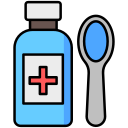
Sporagin
Form: Syrup
Strength: 10mg/ml
Generic Name: Itraconazole
Company: The Ibn Sina Pharmaceutical Ind. Ltd.
MRP:৳ 400.0 (100ml bot)
Is Antibiotic: No
Indications
It is used to treat various fungal infections, including oral and vaginal candidiasis, tinea infections, onychomycosis, and histoplasmosis. It is also used to treat systemic candidiasis, aspergillosis, and cryptococcosis, including cryptococcal meningitis. Additionally, it helps in maintaining therapy in AIDS patients to prevent fungal infections from coming back and to prevent infections in people with weakened immune systems due to prolonged neutropenia.
Pharmacology
It works by blocking certain enzymes (Cytochrome P-450), which are needed to make ergosterol, an important component of fungal cell membranes. Without ergosterol, the cell membrane becomes faulty, which leads to the death of fungal cells. The drug uses a special technology called SUBA that helps it dissolve better, improving how the body absorbs the medication.
Dosage & Administration
For non-systemic fungal infections:
- Vulvovaginal candidiasis: 200 mg twice a day for 1 day.
- Pityriasis versicolor: 200 mg once a day for 7 days.
- Tinea infections: 100 mg once a day for 15 days or 200 mg once a day for 7 days, depending on the infection.
- Oropharyngeal candidiasis: 100 mg once a day for 15 days. For AIDS or neutropenic patients, the dose may be increased to 200 mg once a day for 15 days.
- Onychomycosis: Either 200 mg daily for 3 months or 200 mg twice a day for 7 days, with intervals of 21 days between courses.
For systemic fungal infections:
- Aspergillosis: 200 mg once a day for 2-5 months.
- Candidiasis: 100-200 mg once a day for 3 weeks to 7 months.
- Non-meningeal Cryptococcosis: 200 mg once a day for 10 weeks.
- Cryptococcal meningitis: 200 mg twice a day for 2-6 months.
- Histoplasmosis: 200 mg once or twice a day for up to 8 months.
- Maintenance in AIDS: 200 mg once a day until immune recovery.
- Prophylaxis in neutropenia: 200 mg once a day until immune recovery.
Interaction
It should not be taken with drugs like terfenadine, astemizole, cisapride, or simvastatin. It can also interact with medications such as rifampin, phenytoin, phenobarbital, digoxin, and calcium channel blockers. There is no known experience of overdosage with itraconazole.
Contraindications
It is not recommended for people who are allergic to itraconazole or any ingredient in the medication. It is also contraindicated for those with severe liver disease and those who are taking rifampin.
Side Effects
Some common side effects include nausea, stomach pain, indigestion, constipation, headaches, dizziness, and changes in liver enzymes. Other less common side effects may include menstrual issues, skin rashes, allergic reactions, liver problems, and nerve damage. Prolonged use can sometimes cause low potassium levels, swelling, and hair loss.
Pregnancy & Lactation
It is not safe to use during pregnancy. It is also not recommended to breastfeed while taking itraconazole.
Precautions & Warnings
The absorption of itraconazole can be reduced in patients who are taking medications that neutralize stomach acid. Patients should be cautious if they have any conditions that could affect absorption, and the medication should be taken with care in those with liver issues or compromised immune systems.